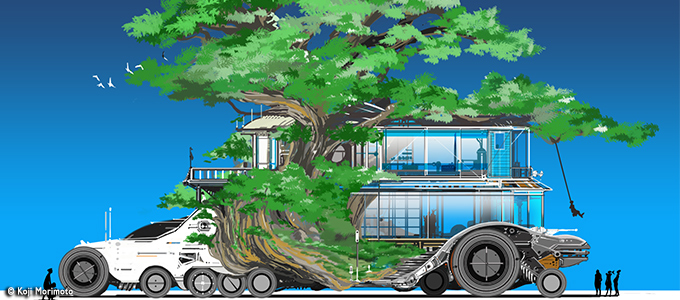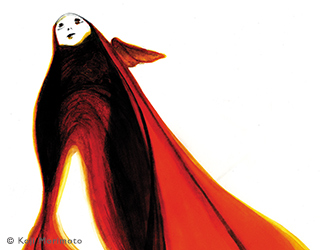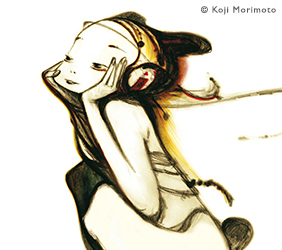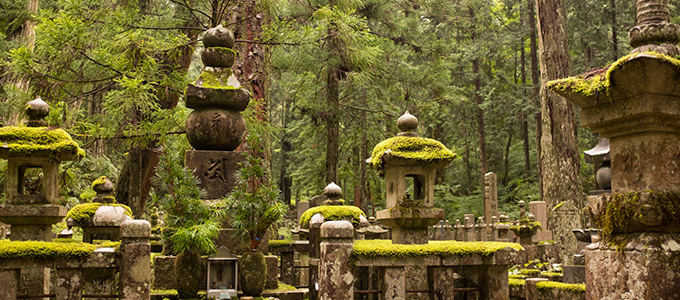
Inconvenient Search For Gratifying Fruit
Even to this day Director Morimoto finds himself asleep under his desk at work once in a while. He has left Studio 4 ℃ that he built on his own, and now oversees Phy, a creative collective. It’s a collective that has no fixed staff at all times. Rather, it calls upon trusted peers anytime there is an upcoming project of interest. What is brought to life at the collective isn’t confined to one medium or genre. This open environment feels perfectly cozy to today’s Director Morimoto.
“I was part of the corporate system until age 50. They told me to clean up around my desk, and started to get nitpicky. Hah. Really, I’d rather create surrounded by all the things I love. When it’s all cleaned and put away, I feel like I lose that creative source.”
“Creating is not necessarily starting from zero. I feel like everyone gets that part confused. The process is really about extracting something from a heap of existing things. It’s a process of making one out of 100. It all comes down to how many 100s you know, and that determines you one. Out of that 100, only one gets to become that ripe fruit.”

It’s not just expression. Our everyday life is also surrounded by tons of things and choices. The great chaos of historical heritage that our forbearers left behind makes us feel that we don’t need to add anything new. For our generation today submerged in an immense amount of information, what is the “ripe fruit” that we need to find in that chaos?
“There are things in this world that we can’t have made easy. We need to maintain some level of inconvenience. For example, when a spider feeds on its captive, it works twice as hard to have its meal. Just by watching, we can’t tell if all of that complicated prep is necessary. But there lies an important mystery that none of us know about yet.”
“Cities are all convenient and all the same. It’s about time that we realize the ‘preciousness of inconvenience’ found in rural areas. The culture of urban migration may be slowly finding its end. It’s such a hassle because we want more and more! From now on, we should just start throwing it all out. It’s more fun when you do away with things. It is not that easy, however, to be self-sufficient in the wild.”
“Furthermore, the city roads seem too wide and so practical. Rural roads are narrow and inconvenient, and that is where exchange happens because you have to interact to let each other pass. Even the old city roads used to feel snugger with on-comers. Then there were more cars, and then more speed. Then we needed wider roads. I feel like people have been disconnected from each other by the car culture.”
“So, personally, I would like to have a car that narrows the distance between people; some inconvenient car. Haha. The cars these days are too fast. The one I am thinking about is a car that moves slowly, at about 5 miles per hour, and looks like a house.” (Smile) “Inside the car there are parks and other spaces, and we all live in it. Some kind of forest car.”

Director Morimoto has spent most of his life in the metropolis of Tokyo, but he is now thinking very seriously about rural living. The ideal habitat is where one could gaze at the sunrise to sunset all day long. Whenever he returns to his hometown of Wakayama, he leaves for the mountains around four in the morning in search of a place to watch the perfect sunrise.
“We tend to be unfamiliar with the mornings around the world. I am very interested in what people of the world are doing in the morning. I wonder what kind of reactions people are having every morning if the sun is very prominent where they live. What kind of relationship do they have to the sun? How do they greet one another? I imagine their climate and food culture is totally different from ours, yet every morning we are observing the same sun.”
“For example, Mt. Narita of Chiba Prefecture has a very interesting view of the morning practice. They just pray and pray for world peace every single day without rest. Not just the Buddhist monks, all sorts of people are there from around the country to take part in this practice. Anyone from regular old folks to even junior high kids could take part in it. When I was there, I was with people who had come from very far staying overnight. It was such a fresh surprise to find that morning I never knew about.”
In the work of Director Morimoto, many sceneries from temples and shrines appear as recurring motif. The opening scene of the film SHORT PEACE depicts that old scenery that anyone who grew up in Japan holds deep in their memory. Leaving us with that indescribable draw to a place beyond the mystical, causing unsettled feelings.
“As a child I never really liked the shrines or Buddhist temples, to tell you the truth. But these days those are the places I visit often, when I find time and go back to my rural hometown. The more I look the more I find appreciation in the craftsmanship of the grounds’ carpenters. What great work. It ought to be a view so familiar to me, since I have been looking up at it since I was little, yet every time I discover something new. It has great depth and so many people’s care go into it. To me, the shrines and temples are the places that taught me all kinds of ‘mysteries.’”
“As a child, I often went to Mt. Koya, too. I love how the scale of trees are so big. People seem so small. I also like Yoshino. In the deep of the mountains, there is nothing along the way to the extent that it is a bit scary. And then you get toward the top of the mountain, and suddenly a town appears that spreads out like it’s above the sky. Both seem to be hidden secret places, tucked in way back there on purpose. Even so, tourists from all over the world find their way there. I feel that they are coming in search of that ‘precious inconvenience.’”
The preciousness of experiencing the mystical world beyond the inconvenient is like a reward that could only be reaped through hassle and hard work. All the bounty that comes from our more easy, quick and convenient life, ironically, may be increasing our deep craving to find the sole seed that becomes the gratifying “ripe fruit.”
(Interview: Manami Iiboshi, Translation: Mika Anami)
